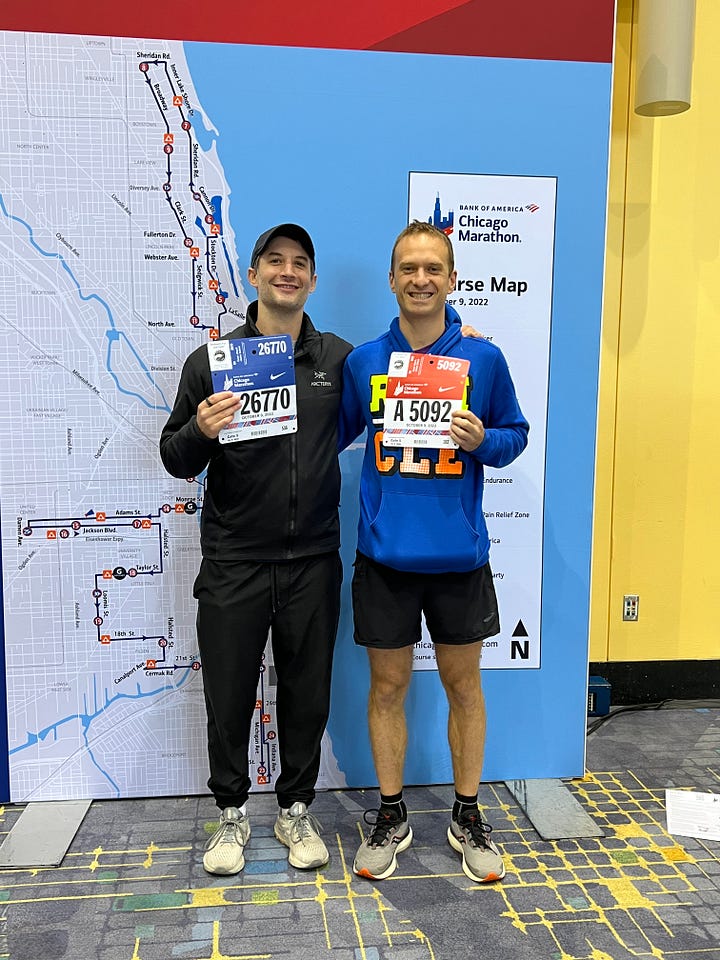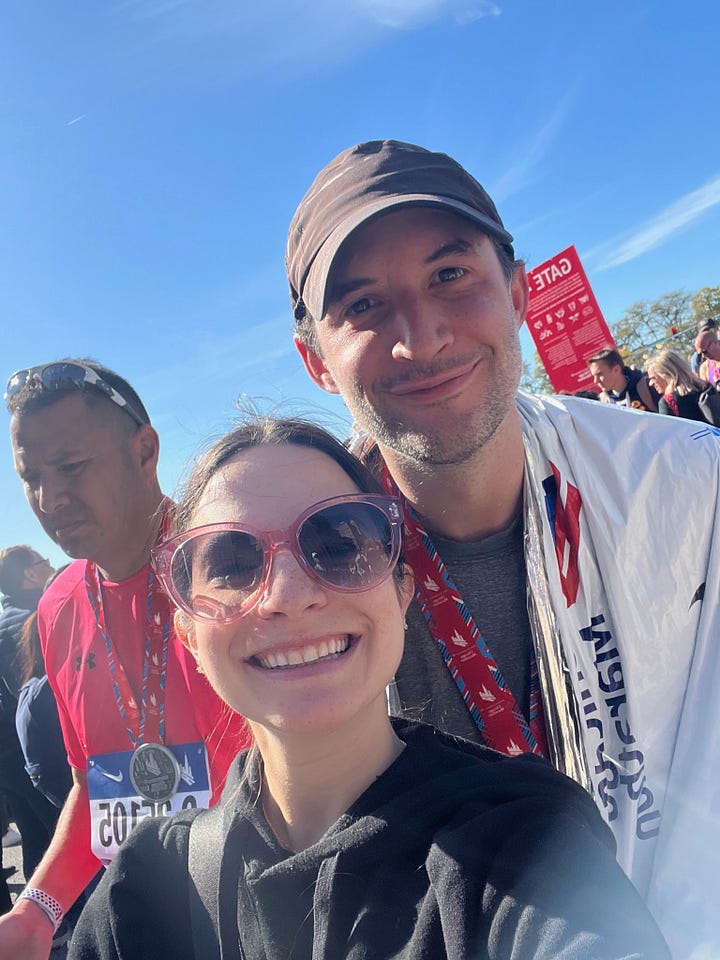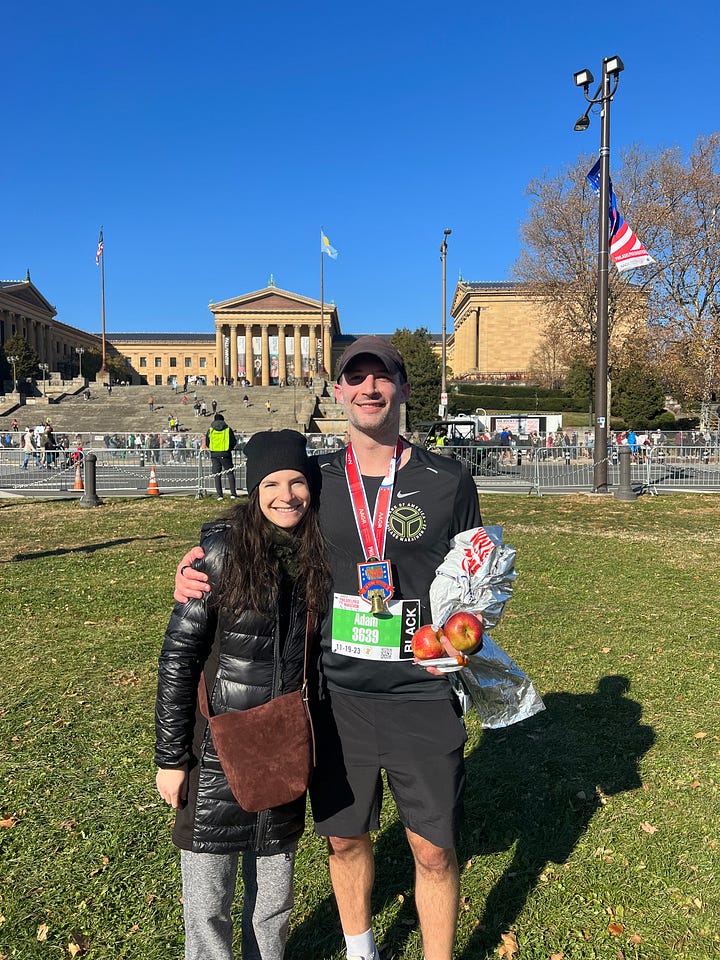Run, Adam, Run
Lessons Learned Marathon Training
In 2021, a high school friend somewhat randomly nudged me to enter the Chicago Marathon lottery. "Lottery? Nobody wins those," I thought. So I nonchalantly signed up.
3 years later and I’m in the final weeks of training for my 4th marathon. This time, the NYC Marathon. Thanks, Josh.




As part of running the NYC marathon, I’m raising money to support Autism Speaks, an incredible organization dedicated to helping those with autism. I'm halfway to my goal and would really appreciate any support to get over the finish line before the Oct 3 deadline!
And thank you to everyone who has already donated! 🙏
Below are 3 lessons learned I’ve learned training the past few years.
1: Slow and Steady Wins the Race
Progress takes time. Patience is key—don't rush to increase mileage or intensity too quickly. Even if you feel capable of running longer or faster in the moment, doing so raises your injury risk. This setback will outweigh any short-term gains. A good rule of thumb: don't increase your mileage by more than 10% per week. Also, include a "cutback" week every 3–4 weeks, reducing mileage by about 20–25%.
I’m starting to realize this approach applies to more than just running. For example, Nat Eliason’s recent essay talks about how creative endurance can be trained like physical endurance.
2: Work Hard, Rest Harder
Before marathon training, I ran almost daily. Despite the frequent runs, my stamina and pace barely improved. I've since learned it's crucial to prioritize rest and recovery. This helps you grow stronger, train harder, and reduce injury risk.
You can achieve this through a variety of means: adequate rest days, cross-training, proper nutrition, quality sleep, etc. Many wearables—like Whoop, Oura, Garmin, and Apple Watch—now offer ways to track rest and recovery using a combination of heart rate variability (HRV), training intensity, sleep scores, and other related metrics.
3: Root Out the Real Problem
When it comes to injuries, treating the root cause is crucial. For example, last year my knee started hurting. It seemed to be a classic case of Runner's Knee. Rest, ice, and elevation reduced the pain, but didn't prevent it from coming back.
After a couple of months of on-and-off pain, I finally went to physical therapy. They helped me understand the root causes: weak hip and quad muscles, and over striding. They recommended exercises and suggested increasing my cadence to reduce over striding, which would put less stress on my knees.
While addressing these root causes hasn't completely eliminated the pain, it's helped me manage it much better and reduce the frequency of training setbacks due to injury.
As part of running the NYC marathon, I’m raising money to support Autism Speaks, an incredible organization dedicated to helping those with autism. I'm halfway to my goal and would really appreciate any support to get over the finish line before the Oct 3 deadline!
Every donation counts:
And thank you to everyone who has already donated! 🙏
If you have any questions related to training, fueling, watches, shoes, injuries — whatever — please reach out! I love connecting with other runners and geeking out on all things running.
In the meantime, below are some of my favorite communities, apps, watches, and people that have helped me along the way!
🎽 Endorphins: A free running community with 15k+ members. While I haven’t actually been to an in person event, their online forum is great. Also, their Philly marathon cheer squad was epic. Confetti cannon included.
📱 Run with Hal: A training app I used for my first two marathons. Has different levels of difficulty, and allows you to easily adapt training to your schedule. There are newer apps like Runna that look neat too, but I haven’t tried those.
⌚ Garmin Forerunner Series: I got a Garmin Forerunner 965 last year and have been loving it. I’m an Apple fan boy and wasn’t sure if I’d like the transition from an Apple Watch. While it’s not as easy to use for music or podcasts, if you use your phone for that type of stuff the actual running and training related features are SO much better (training readiness, structured workouts, built in coaching).
📣 Noa Besner: I used a coach for the first time last year when training for Philly, and am working with Noa for NYC. In addition to the personalized workouts, extra accountability, and race prep, I’ve found having a coach particularly useful to help navigate pesky injuries. Noa’s combination of knowledge and passion is hard to beat!
Whether or not you’re a runner, I hope these lessons and resources help you in some shape or form. If you’re active on Strava shoot me your link or give me a follow.
Until next time,
Adam



